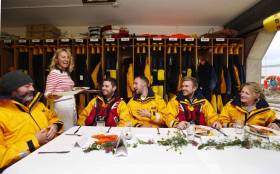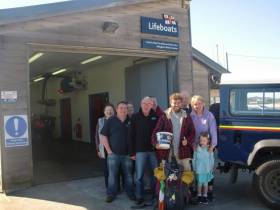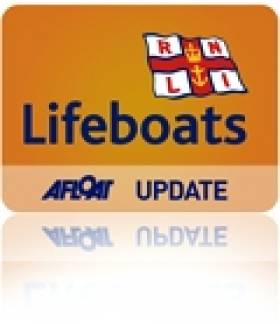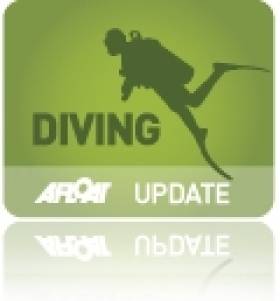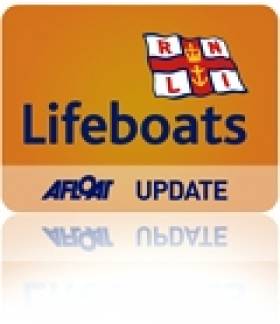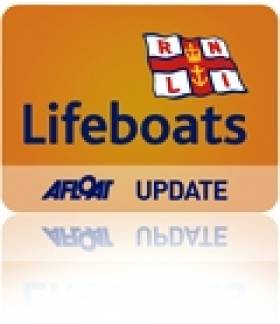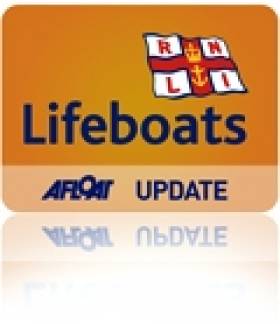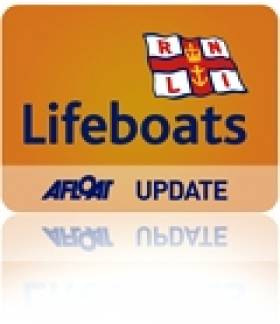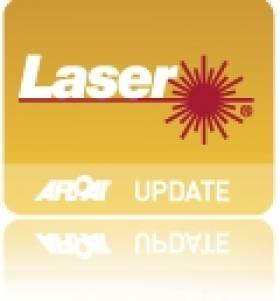Displaying items by tag: Fundraising
Chef Clodagh McKenna Serves Fish Supper Treat For Howth Lifeboat Crew
#RNLI - Celebrated chef, food writer and television personality Clodagh McKenna recently visited Howth Lifeboat Station, where she treated the volunteer crew to a delicious seafood supper.
McKenna’s visit marks the countdown to the RNLI’s upcoming foodie fundraiser Fish Supper, for which the charity is encouraging people across Ireland to host a fish-themed dinner between 14–16 October to raise funds to help save lives at sea.
The Clodagh’s Irish Kitchen author served a three-course meal for the lifeboat crew, starting with fresh Dingle crab cakes with Irish heirloom tomatoes and fennel aioli.
The main dish was pan-fried sea bass with hazelnut butter with dill potato dumplings and autumn vegetable salad. For dessert, the crew were treated to McKenna’s signature chocolate Guinness cake.
“It was an absolute pleasure to cook for the Howth volunteer lifeboat crew,” said McKenna. “My grandpop and uncle were both fishermen, so the work of the RNLI is very close to my heart.
“When I was filming my series Fresh From the Sea for RTÉ, I was lucky enough to get to see the work of the RNLI first hand. Please sign up to make a Fish Supper and help the courageous crews save more lives at sea.”
Last year, RNLI volunteer crew members across Ireland and the UK missed nearly 7,000 evening meals with their loved ones to brave cold, angry and often dangerous waters to save lives.
Fish Supper aims to highlight the disrupted dinners RNLI crew experience day-in-day-out, and the commitment shown not only by them but their families, who often have an empty place at the dinner table.
RNLI volunteers give up their time, comfort and often home cooked meals to respond immediately when the pagers go off.
“Our lifeboat crew here in Howth and indeed across Ireland are prepared to drop everything and respond to a call out at a moment’s notice,” said Howth RNLI mechanic Ian Sheridan.
“Our lifesaving work is essential and often challenging and dangerous. As volunteers, we are extremely grateful to people who donate so generously and host fundraising events such as Fish Supper to enable us to do what we do.”
To request your free fundraising pack and receive more information, visit RNLI.org/FishSupper where you’ll also find recipes, party game ideas and place name cards to help the evening go well.
Last year, RNLI lifeboat crews across 45 stations in Ireland had 1,098 lifeboat launches, bringing 1,244 people to safety. Of all recorded launches, 416 were carried out in the hours of darkness.
Local Community Raises Vital Funds For Larne RNLI
#RNLI - Over the last few months the generous people of Larne have raised over £2,000 for their local lifeboat station.
More than £600 was raised by the Great Northern Retro car rally that left Larne at 9am on Saturday 30 April, travelling up the scenic Antrim Coast to Malin Head. The event was very well supported with vehicles of all makes and models.
Meanwhile, local man John Stirling – father of lifeboat crew member Lee Stirling – celebrated his 60th birthday recently with a donation of £300 to the Larne lifeboat.
The Stirling family organised a surprise party and kindly asked for donations to Larne RNLI and the NI Air Ambulance in lieu of gifts.
Additionally, Larne Grammar School year 8 pupils, who are committed supporters of Larne RNLI, have again this year presented their local lifeboat station with a cheque for £1147.89 raised throughout the academic year.
"The people of Larne are very generous and dedicated supporters of our local lifeboat crew," said Jim Kerr, Larne RNLI fundraising chair, :I attended the start of the car rally and it was a fantastic spectacle to see the camper vans and cars leave Larne.
"I’d like to thank Gavin Gray who organised the NI Retros car rally, John Stirling for his birthday donation and the year 8 pupils of Larne grammar school for their kind donations.
"RNLI volunteer lifeboat crews around Ireland are willing to drop everything to go and save lives at sea when their pagers beep. We rely on the generosity of the public to continue our lifesaving service, which we operate day and night, 365 days a year.
"These donations can help fund crew training, contribute towards the running costs of a lifeboat station or buy new crew kit and are greatly appreciated by all at Larne RNLI."
#RNLI - Alex Ellis-Roswell recently walked into Mayo without any fanfare but with the sole aim to continue his marathon walk to raise funds for the RNLI, a charity close to his heart.
The 23-year-old Kent native is well on his way to smashing a £20,000 (€25,000) fundraising target which will see vital funds raised for the lifeboats.
When he set out 649 days ago, Ellis-Roswell planned to walk along the British coastline only, but he changed his mind and boarded a ferry to Belfast last year to add the beautiful Irish coastline to his journey.
When he finishes he will have walked the entire length of the Irish and UK coasts.
Ellis-Roswell has had many adventures along the way with strangers opening their doors to him and providing food and company for him along the way. Their kindness has seen him almost reach his target, which he now plans to exceed.
The weather had not been kind along the way, and he has pitched his tent in some stunning but remote places with the wind and the rain beating down on him. He has also battled with the toll the epic walk has taken on both his knees.
Starting his walk in Ireland at Belfast last year, he came down along the east coast before rounding the southern coastline and trekking along the Cork and Kerry peninsulas, clocking up hundreds of kilometres.
He has now crossed the border into Mayo and the sun has come out to match the hospitality of the locals to make it a special stop on his journey. Two important places for him to call in to visit have been the Achill and Ballyglass RNLI lifeboat stations, where he was made feel very welcome.
Commenting on the incredible fundraising initiative when Ellis-Roswell stopped by to visit the lifeboat crew and fundraisers with Ballyglass RNLI, the station’s volunteer lifeboat press officer Agatha Hunt said: "We were honoured to welcome Alex to our door and to hear about his adventures so far. It is incredible to think that a young man from across the water would do this for a charity which is very close to all of us here.
"Every lifeboat station and volunteer shares a common goal to save lives and help those in difficulty but it is very touching to see someone so young doing this to help in our work. I know his father, who also had great affection, for the RNLI would have been very proud of him."
Huge thanks are also due to the Broadhaven Bay Hotel, Léim Siar B&B Blacksod, Western Strand Hotel and the Kilcummin Lodge B&B who supported the young man in his walk by providing accommodation during his visit.
If people wish donate to Alex Ellis-Roswell they can do so via his online fundraising page. He is also cataloguing his journey on social media and can be followed on Facebook or Twitter.
#RNLI - Friends of Andrew Bridge, the 21-year-old skipper of the lost yacht Cheeki Rafiki, are setting sail in his memory to raise money for the RNLI.
And donations to their fundraising page for the lifeboat charity have reached £20,000 in their first 24 hours of fundraising.
Nicky Evans, Roger Swift and Kate Dawes were due to take part in the Sevenstar Round Britain and Ireland Race this August on the Cheeki Rafiki with Andrew.
Sadly, the loss of the Cheeki Rafiki in May means that this will no longer happen, but Andrew’s friends are determined to carry on as a tribute to him and the other men who were lost, Paul Goslin, Steve Warren and James Male.
Evans, a sign language interpreter from London, was the person who set up a petition calling on the US Coast Guard to resume the search for the Cheeki Rafiki crew.
The petition was signed by 243,095 people, helping galvanise public support for the missing men.
Evans, Swift and Dawes had sailed with Andrew many times, including taking part in the famous Fastnet Race last year on the Cheeki Rafiki.
Swift, a retired police officer from Kent, said today: “We wanted to do the Round Britain and Ireland Race in memory of Andy who should have been with us.
“It will be a bittersweet occasion for us. Even just getting together to train for the first time next weekend will be bittersweet.
"Cheeki Rafiki should have been back in her home port of Southampton and we should have been out training on her with Andy. I think it will be particularly hard for Nicky as when we last sailed with Andy she was very ill and he really looked after her.
“We are just overwhelmed, humbled really, by how much people have donated already. It’s something we will really be thinking about when we set off. We are looking forward to doing this for Andy and hopefully raising even more.”
Swift added: “The RNLI is the most obvious charity under the circumstances; we are all passionate believers in the RNLI tradition of lifesaving.
“I remember from the Fastnet Race, that when you are out on a boat in the middle of the night and the weather’s bad, it’s a very comforting thought knowing that the RNLI are not that far away should you need help.
“When we are taking part in the Round Britain and Ireland Race, and we’re out on the West Coast of Ireland or up round the Shetlands, we will know the RNLI is out there too.”
Along with the fundraising started by Andrew Bridge’s sailing friends, an RNLI tribute fund has been set up by the families of the Cheeki Rafiki crew.
They want to raise money to promote the work of the RNLI and to fund personal locator beacons for RNLI crew. This tribute fund will remain online indefinitely, as a memorial for the men.
Other fundraising challenges have also been started to collect funds for it. Among them, Adele Miller, partner of James Male, will be abseiling the Spinnaker Tower in Portsmouth.
Cressida Goslin, wife of Paul Goslin, said: “I’m grateful to all those ensuring that Paul, James, Steve and Andy are not forgotten. We’ve set up our own Forever by the Sea fund to raise money for the RNLI in memory of our loved ones.
"Others, like Nicky Evans and her Round Britain and Ireland crew, are also raising money for the RNLI in their memory.
“We’ve been overwhelmed with people’s responses to the loss of the Cheeki Rafiki, both during the search and now with people donating so generously. It means a great deal to us and we’d like to say thank you to everyone for their efforts.”
#Diving - An Irishman who set a world record for long-distance SCUBA diving is preparing to double that incredible feat.
Christopher Healy set the Guinness World Record for the fastest SCUBA dive over a distance of 10km in October 2011 in an effort to raise funds for the Share a Dream Foundation, which raised the spirits of his son Stephen when he was diagnosed with Non-Hodgkin's Lymphoma.
The experienced diving instructor - who runs the Atlantic Diving School in Co Clare - followed a long line of Irish divers such as Declan Devine, Sean McGahern and Paul Devane who've either smashed or attempted to smash records in the field.
And Healy has since written a book, The 10K Record, about the highs and lows of his journey to breaking the record.
But this weekend he aims to double that effort - and raise more funds for Share a Dream and Temple Street Children's Hospital - by SCUBA diving an unbroken 20km route in Lough Derg.
Staring at Mountshannon Harbour at 3am this Sunday 7 July, Healy will travel underwater towards Scariff and back via Scilly Island to Killaloe, aiming to arrive around 3pm.
He will be accompanied along the way by a small flotilla of support boats to replace his air supply and record his journey for verification.
For more about Healy's 20km diving challenge and how you can donate, visit the Facebook page HERE.
Arklow RNLI Hosts Summer Solstice Fundraiser
#RNLI - Arklow RNLI supporters are being asked to come out and walk or jog a midnight mile - four laps of the running track at Coral Leisure Centre - in Arklow this Friday 21 June.
The walk/run will take place on the Summer Solstice from 10pm. The event is free and all donations are welcome. Prize raffles will take place, and Stormy Stan and his lifeboat buddies will be on hand to cheer on the participants.
Participants are being asked to assemble at the Lake Coffee Shop in the leisure centre from 10pm, with the walk/jog commencing just before midnight.
Full details are available from Mary at 086 304 5418.
In other Arklow RNLI news, a former chairman of fundraising at the lifeboat unit was honoured recently by the charity for his trojan work recently.
Tommy Annesley, a local councillor, received the Bronze Award at the recent RNLI Annual Presentation of Awards at Trinity College Dublin.
A few days later, Annesley was again honoured, this time by his hometown and fellow councillors when he became Lord Mayor of Arklow.
All at Arklow RNLI including lifeboat crew, fundraisers and other volunteers extended their best wishes to Tommy Annesley for his tenure as Lord Mayor.
Meanwhile, at the recent RNLI AGM in London, Arklow RNLI operations manager Jimmy Tyrell made a presentation to current RNLI operations director Mike Vlasto to honour the relationship and friendship that has developed between them in their years in the RNLI.
- A unique handcrafted piece was made locally in Arklow for the presentation.
Both Tyrell and Vlasto are retiring from the RNLI over the next year.
Station To Station Challenge Raises More Than €2,000 For RNLI
#RNLI - Two men who embarked on the first RNLI Station to Station challenge between Bundoran and Arranmore last Saturday (6 April) completed the job in just under 12 hours - raising over €2,000 for both lifeboat stations in the process.
As per their plan reported previously on Afloat.ie, Niall Clancy and James McIntyre both set off from Bundoran Lifeboat Station just after 6am on Saturday morning – Clancy running and McIntyre cycling.
Clancy's route took him through Bundoran, Ballyshannon, Donegal town, Mountcharles, Frosses, Glenties, Gweebarra Bridge, Lettermacaward, Dungloe, Burtonport and finally Arranmore Island via a treadmill on the ferry!
He was joined on various legs of the journey by members of the Tir Chonaill Athletic Club who kept his spirits up on the 100km journey from station to station.
Meanwhile, McIntyre and his team from Mullaghmore Triathlon Club and Donegal Bay Cycling Club took off at the same time cycling as far as Lough Eske, where James then made the lonesome journey himself across the Bluestack Mountains, constantly keeping organisers informed of his progress via text message.
Down into Glenties and from there by bike to Portnoo where, with Bundoran RNLI crewman Killian O’Kelly, he kayaked the remaining 22km to Arranmore Island, where both he and Clancy were greeted by the lifeboat crew and the Arranmore Pipe Band.
Speaking on completion of the challenge at Arranmore RNLI Lifeboat Station, Clancy said: "It’s been a long but great day. The weather conditions couldn’t have been any better for both myself and James – though it was very cold this morning leaving Bundoran!
"I’m looking forward to a few weeks off training before I get back into it for the Athlone Half Ironman in August."
McIntyre added: "We’d both like to express our gratitude to everyone who supported us ahead of the challenge and today – particularly those who sponsored us and those who ran and cycled with us today, our support teams, our chefs, the RNLI crews and sponsors Ormston’s Mace Ballyshannon and All Sports Donegal Town."
Shane Smith, volunteer lifeboat press officer for Bundoran RNLI, said: "We are thrilled at the success of the challenge and delighted that over €2,000 has been raised for both stations.
"We are indebted to James and Niall for their selfless support of our charity and would like to thank them sincerely on behalf of both crews."
Elsewhere, a Wexford family who organised a sponsored swim in memory of a loved one and former volunteer have raised a whopping €5,000 for Kilmore Quay RNLI.
The Hayes family presented the cheque to the RNLI at Kilmore Quay lifeboat station recently, funded by a sponsored swim on St Stephen’s Day organised by the family in memory of the late Paddy Hayes, who was a volunteer with the lifeboat.
Howth Duo Cycling From London To Paris For RNLI
#HowthRNLI - Howth locals Jennifer Murphy and Brendan Mulligan will be taking part in the London to Paris Bike Ride in aid of Howth RNLI.
The 377km charity challenge will take place between 23 and 26 August. Riders will depart from London and cycle past Hampton Court and through the North and South Downs to Portsmouth.
After crossing the English Channel on a ferry they will arrive in France at Caen and travel through the French countryside to Evreux. On the final day, all the cyclists will head to their final destination of the Arc de Triomphe in Paris.
Murphy said: "We decided to do the challenge for Howth RNLI because it is a local charity. We know some of the volunteer crew, including my boss!"
The duo are collecting sponsorships at their MyCharity.ie page HERE.
And according to Howth RNLI's Rise Michael, the funds they raise will ensure the north Dublin volunteer lifeboat crews can go to sea with the best equipment available, preserving their safety when saving lives at sea.
Meanwhile, Howth RNLI is hosting a 'boat jumble' sale at Howth Sea Angling Club from 10.30am to 1pm on Saturday 13 April.
All are welcome to bring along boat gear, fishing gear, dinghies, wetsuits, sails, books and any other nautical-related items.
Tables cost €20 each, with 25% of sales donated to the RNLI. Alternatively, items can be donated to ‘The Bosun’s Locker’ with all sale proceeds going to the RNLI.
The RNLI Sea Safety Team will be on hand to check lifejacket safety and give advice, and RNLI souvenirs will also be available. For more details contact Barbara Sargent on 01 832 5392 or Rose Michael on 087 255 2726.
Michael adds that the funds raised by the jumble sale will go towards Howth RNLI's current fundraising project to fund the running and maintenance costs of the lifeboat station for a week.
Schoolkids Raise €1,300 for Howth RNLI
#RNLI - Children from Scoil Oilibhéir Naofa in Kilcloon, Co Meath yesterday visited the Howth RNLI lifeboat station to present a cheque for €1,300 raised by pupils through a Christmas fair and a 'Chore Tuesday' at their school.
Project teams from the class presented posters and poems about sea safety, the crew kit and the lifeboat. They also met lifeboat station mechanic and crew member Ian Sheridan, who was so impressed by their work that he presented them with a special RNLI flag to hang in their classroom. All of the pupils then had the opportunity to get onboard the inshore lifeboat.
Following a visit to the school by the RNLI Education Team before Christmas, pupils became interested in the lifesaving work carried out by the volunteer lifeboat crews, and were inspired to organise a fundraiser to help save lives at sea.
"The funds raised by the pupils of Scoil Oilibhéir Naofa will go towards our current fundraising project to fund the running and maintenance costs of the lifeboat station for a week," said Howth RNLI fundraising chair Rose Michael.
UK Laser Sailors in £50K Irish Sea Crossing Challenge
#LASER - A pair of British sailors are set to embark on an intrepid crossing of the Irish Sea using just two single-handed Laser dingies.
David Summerville and Steve Cockerill had originally planned to make the crossing in September last year, but those plans were scuppered by 50-knot gale force winds and a 12-foot tidal swell, according to Incentive Travel.
But the duo is now planning to try again, with the backing of the Ramada Plaza Southport.
“David and Steve will be covering 115 nautical miles during the challenge," said Ramada Plaza general manager Enda Rylands. "They will set off from my own home town of Dublin and finish in Southport, aiming to raise £50,000 for mental health charity Mind and the John Merricks Sailing Trust."
Summerville, a 53-year-old grandfather of two who runs a boat repair business, said the date of the challenge would again depend on weather and tidal conditions, and that the pair is ready to depart any time from mid-April to mid-September.
It's not the first time that an Irish Sea crossing has been done in a Laser as Tiffany Brien achieved the feat in 2010, sailing single-handedly the 30 miles from Portpatrick in Scotland to Belfast Lough.
But Summerville and Cockerill's ambitious undertaking, at more than three times that distance, would surely get them a place in the record books - provided the weather goes their way!


























